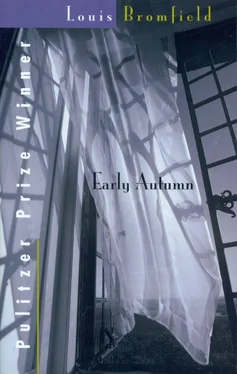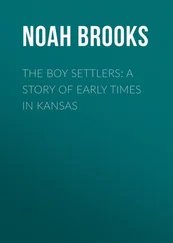“I don’t know,” said Olivia quietly. “They’ve been like that ever since I came to Pentlands.” (And as she spoke she was overcome by a terrible feeling of sadness, of an abysmal futility. It had come to her more and more often of late, so often that at times it alarmed her lest she was growing morbid.)
Sabine was speaking again in her familiar, precise, metallic voice. “I wonder,” she said, “if there has ever been anything. …”
Olivia, divining the rest of the question, answered it quickly, interrupting the speech. “No … I’m sure there’s never been anything more than we’ve seen. … I know him well enough to know that.”
For a long time Sabine remained thoughtful, and at last she said: “No … I suppose you’re right. There couldn’t have been anything. He’s the last of the Puritans. … The others don’t count. They go on pretending, but they don’t believe anymore. They’ve no vitality left. They’re only hypocrites and shadows. … He’s the last of the royal line.”
She picked up her silver cloak and, flinging it about her fine white shoulders, said abruptly: “It’s almost morning. I must get some sleep. The time’s coming when I have to think about such things. We’re not as young as we once were, Olivia.”
On the moonlit terrace she turned and asked: “Where was O’Hara? I didn’t see him.”
“No … he was asked. I think he didn’t come on account of Anson and Aunt Cassie.”
The only reply made by Sabine was a kind of scornful grunt. She turned away and entered her motorcar. The ball was over now and the last guest gone, and she had missed nothing—Aunt Cassie, nor old John Pentland, nor O’Hara’s absence, nor even Higgins watching them all in the moonlight from the shadow of the lilacs.
The night had turned cold as the morning approached and Olivia, standing in the doorway, shivered a little as she watched Sabine enter her motorcar and drive away. Far across the meadows she saw the lights of John Pentland’s motorcar racing along the lane on the way to the house of old Mrs. Soames; she watched them as they swept out of sight behind the birch thicket and reappeared once more beyond the turnpike, and as she turned away at last it occurred to her that the life at Pentlands had undergone some subtle change since the return of Sabine.
It was Olivia’s habit (and in some way every small action at Pentlands came inevitably to be a habit) to go about the house each night before climbing the paneled stairs, to see that all was in order, and by instinct she made the little tour as usual after Sabine had disappeared, stopping here and there to speak to the servants, bidding them to go to bed and clear away in the morning. On her way she found that the door of the drawing room, which had been open all the evening, was now, for some reason, closed.
It was a big square room belonging to the old part of the house that had been built by the Pentland who made a fortune out of equipping privateers and practicing a sort of piracy upon British merchantmen—a room which in the passing of years had come to be a museum filled with the relics and souvenirs of a family which could trace its ancestry back three hundred years to a small dissenting shopkeeper who had stepped ashore on the bleak New England coast very soon after Miles Standish and Priscilla Alden. It was a room much used by all the family and had a worn, pleasant look that compensated for the monstrous and incongruous collection of pictures and furniture. There were two or three Sheraton and Hepplewhite chairs and a handsome old mahogany table, and there were a plush sofa and a vast rocking chair of uncertain ancestry, and a hideous bronze lamp that had been the gift of Mr. Longfellow to old John Pentland’s mother. There were two execrable watercolors—one of the Tiber and the Castle San Angelo and one of an Italian village—made by Miss Maria Pentland during a tour of Italy in 1846, and a stuffed chair with tassels, a gift from old Colonel Higginson, a frigid steel engraving of the Signing of the Declaration which hung over the white mantelpiece, and a complete set of Woodrow Wilson’s History of the United States given by Senator Lodge (whom Aunt Cassie always referred to as “dear Mr. Lodge”). In this room were collected mementoes of long visits paid by Mr. Lowell and Mr. Emerson and General Curtis and other good New Englanders, all souvenirs which Olivia had left exactly as she found them when she came to the big house as the bride of Anson Pentland; and to those who knew the room and the family there was nothing unbeautiful or absurd about it. The effect was historical. On entering it one almost expected a guide to step forward and say, “Mr. Longfellow once wrote at this desk,” and, “This was Senator Lodge’s favorite chair.” Olivia knew each tiny thing in the room with a sharp sense of intimacy.
She opened the door softly and found that the lights were still burning and, strangest of all, that her husband was sitting at the old desk surrounded by the musty books and yellowed letters and papers from which he was compiling laboriously a book known as “The Pentland Family and the Massachusetts Bay Colony.” The sight of him surprised her, for it was his habit to retire punctually at eleven every night, even on such an occasion as this. He had disappeared hours earlier from the ball, and he still sat here in his dinner coat, though it was long after midnight.
She had entered the room so softly that he did not hear her, and for a moment she remained silently looking down at him, as if undetermined whether to speak or to go quietly away. He sat with his back to her so that the sloping shoulders and the thin, ridged neck and partly bald head stood outlined against the white of the paneling. Suddenly, as if conscious of being watched, he turned and looked at her. He was a man of forty-nine who looked older, with a long horse-face like Aunt Cassie’s—a face that was handsome in a tired, yellow sort of way—and small, round eyes the color of pale blue porcelain. At the sight of Olivia the face took on a pouting expression of sourness … a look which she knew well as one that he wore when he meant to complain of something.
“You are sitting up very late,” she observed quietly, with a deliberate air of having noticed nothing unusual.
“I was waiting to speak to you. I want to talk with you. Please sit down for a moment.”
There was an odd sense of strangeness in their manner toward each other, as if there had never been, even years before when the children were babies, any great intimacy between them. On his part there was, too, a sort of stiff and nervous formality, rather quaint and Victorian, and touched by an odd air of timidity. He was a man who would always do not perhaps the proper thing, but the thing accepted by his world as “proper.”
It was the first time since morning that the conversation between them had emerged from the set pattern which it had followed day after day for so many years. When he said that he wanted to speak to her, it meant usually that there was some complaint to be made against the servants, more often than not against Higgins, whom he disliked with an odd, inexplicable intensity.
Olivia sat down, irritated that he should have chosen this hour when she was tired, to make some petty comment on the workings of the house. Half without thinking and half with a sudden warm knowledge that it would annoy him to see her smoking, she lighted a cigarette; and as she sat there, waiting until he had blotted with scrupulous care the page on which he had been writing, she became conscious slowly of a strange, unaccustomed desire to be disagreeable, to create in some way an excitement that would shatter for a moment the overwhelming sense of monotony and so relieve her nerves. She thought, “What has come over me? Am I one of those women who enjoys working up scenes?”
Читать дальше












